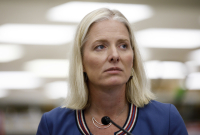Support strong Canadian climate journalism for 2025
A prominent British Columbia businessman and philanthropist's defamation lawsuit against Twitter Inc. can proceed in a court in the province, a judge has ruled.
Frank Giustra, founder of Lionsgate Entertainment, alleges in a lawsuit that numerous tweets were published linking him to a debunked child sex trafficking conspiracy theory known as "pizzagate."
Twitter filed an application asking the B.C. Supreme Court to decline jurisdiction in favour of California, where the company is headquartered.
However, Justice Elliott Myers wrote in a decision posted online Friday that Canadian law has established that internet defamation takes place where the statements are read.
There is no evidence as to the number of people in B.C. who read the tweets but it appears there are at least 500,000 Twitter users in the province, Myers wrote.
"In my view for the purposes of a jurisdictional challenge ... Giustra has gone far enough in demonstrating damage to his reputation here," the judge added.
Giustra, a member of the Order of B.C., has strong ties to the province and a significant local reputation to protect, Myers wrote, adding that many of the tweets were not only American-centric but referred to B.C. and Canada.
Under U.S. law, Twitter would not be liable for the tweets because of freedom of speech protections in the country's constitution but Canada has no similar statutes, Myers said.
"Whether the Canadian common law provides or should provide similar protection to a platform such as Twitter would be a matter for an ultimate trial," the judge wrote.
Twitter declined to comment on the ruling, which dealt only with jurisdiction and not with the substance of Giustra's civil claim.
Giustra said he hopes the lawsuit will help raise awareness of the "real harm to society" if social media platforms are not held responsible for the content published on their sites.
"I believe that words do matter, and recent events have demonstrated that hate speech can incite violence with deadly consequences," he said in a statement.
His lawyer, Fred Kozak, added the decision is an important step toward holding American social media platforms accountable in Canada and applying the same standards imposed on print and broadcast media entities.
None of the allegations contained in Giustra's lawsuit has been proven in court.
His statement of claim filed in April 2019 said he faced a targeted attack on Twitter by a group who set out to vilify him for political purposes starting around February 2015.
"Those publications included tweets stating that the plaintiff is 'corrupt,' a 'murderous thief,' a 'criminal,' and is involved in 'pizzagate,' '' it said, referring to the unfounded conspiracy theory that claimed Democrats harbour child sex slaves at a pizza restaurant in Washington, D.C.
The statement of claim said Giustra sits on the board of the Clinton Foundation, a non-profit organization founded by former U.S. president Bill Clinton, and the tweets escalated during the 2016 U.S. election.
The company said in its application to the court that it took action in response to several letters and emails sent by Giustra from 2016 through 2019 requesting that it remove certain tweets.
Twitter said that as of late June 2019, most of the 98 tweets at issue in Giustra's claim were removed and unable to be viewed in Canada. Of the 18 tweets that remain on the platform, eight are blocked in Canada but are accessible outside of the country, it said.
It also said it provides a "platform for expression'' and none of the tweets at issue in Giustra's claim were written or posted by the company.
Twitter argued that it has no employees or assets in B.C. or Canada, apart from a subsidiary in Toronto, Twitter Canada ULC, which primarily focuses on marketing.
Myers wrote in his ruling that Twitter did not disclose the direct or indirect ownership structure of Twitter Canada.
This report by The Canadian Press was first published Jan. 15, 2021.





Comments